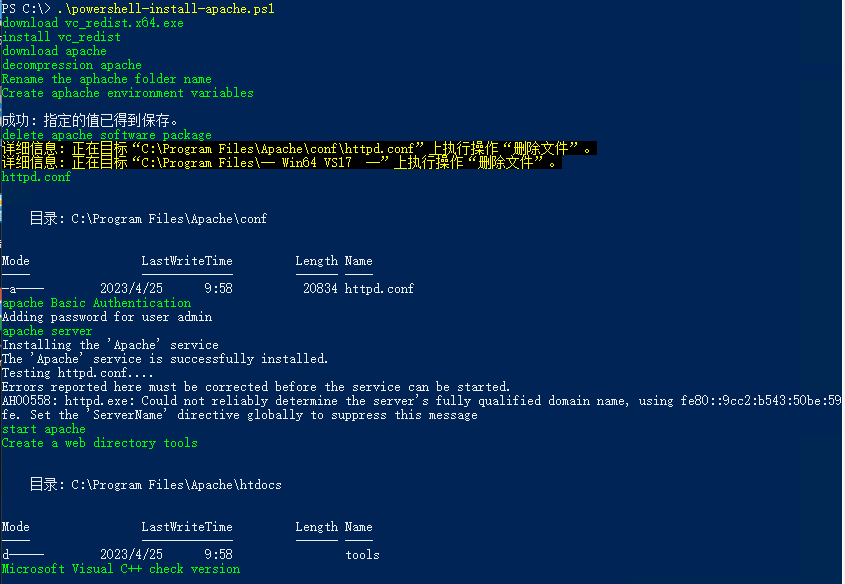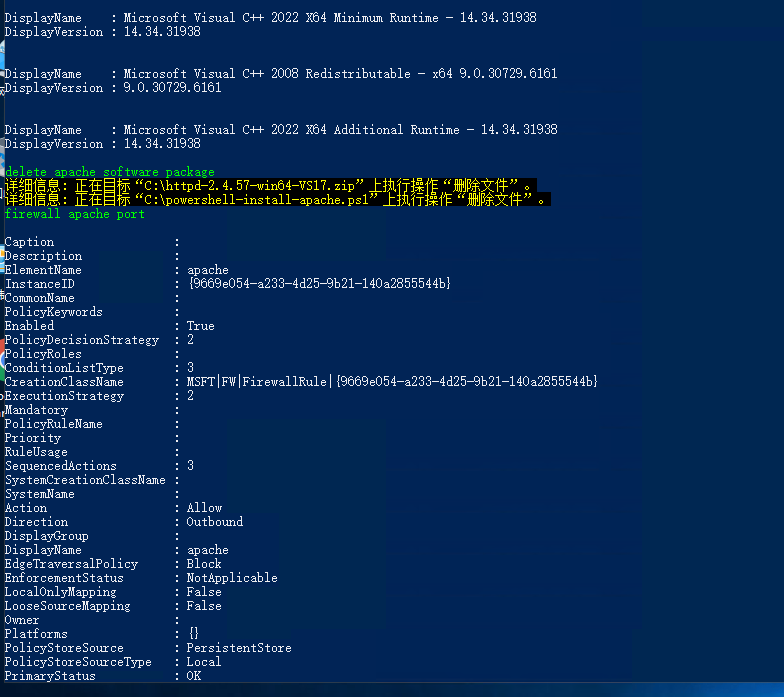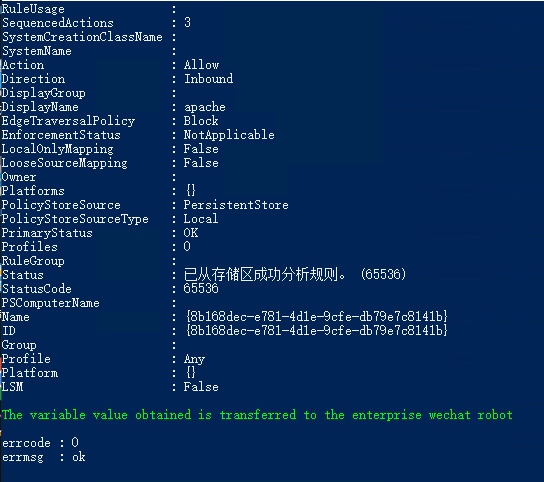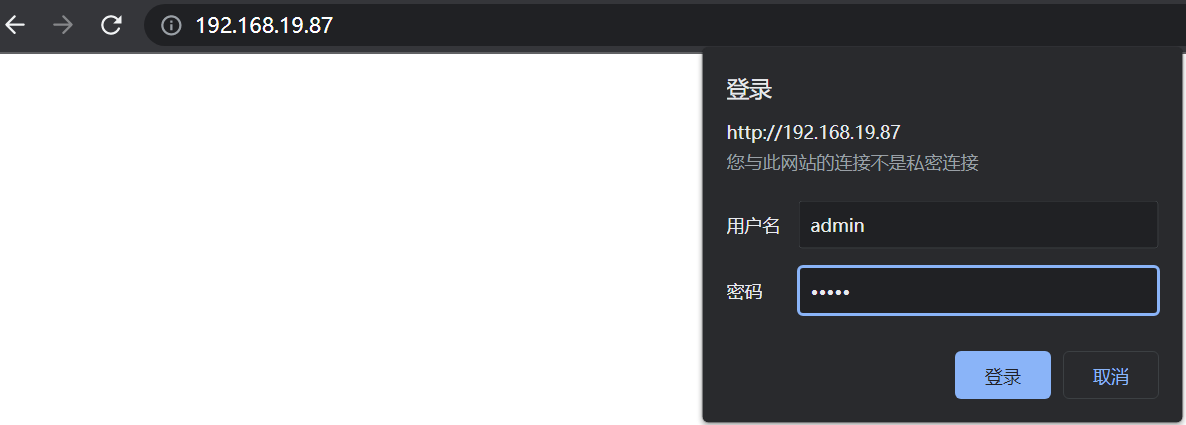您现在的位置是:首页 >学无止境 >PowerShell install 一键部署http+用户名密码登录实现文件系统网站首页学无止境
PowerShell install 一键部署http+用户名密码登录实现文件系统
简介PowerShell install 一键部署http+用户名密码登录实现文件系统

Apache 前言
Apache(音译为阿帕奇)是世界使用排名第一的Web服务器软件。它可以运行在几乎所有广泛使用的计算机平台上,由于其跨平台和安全性被广泛使用,是最流行的Web服务器端软件之一。它快速、可靠并且可通过简单的API扩充,将Perl/Python等解释器编译到服务器中。
Apache Windows系统支持
- Windows 7 SP1
- Windows 8 / 8.1
- Windows 10
- Windows 11
- Windows Server 2022
- Windows Server 2019
- Windows Server 2016
- Windows Server 2008 R2 SP1
- Windows Server 2012 / R2
- Windows Vista SP2
依赖VisualC++
- Visual C++ Redistributable for Visual Studio 2015-2022 x64
- 所有包含历史版下载
download
| apache | 文档 | Visual c++ |
| download | 参考 | download |
前提条件
- 开启wmi,配置网卡,参考
一键部署apache自动化脚本编写
- 实现安装apache,环境变量设置,配置自定义httpd.conf配置文件,增加登录用户名验证,创建启动服务,防火墙配置
- 官网基于powershell 部署apache参考
- $webhook = "https://qyapi.weixin.qq.com/cgi-bin/webhook/send?key=XXXX" #企业微信机器人地址
- 安装目录C:Program FilesApache
- 登录密码admin/admin
- 登录用户名密码配置文件位置C:Program FilesApacheconf.password_admin
- 配置文件目录C:Program FilesApacheconfhttpd.conf
- 手动下载httpd-2.4.57-win64-VS17.zip到C盘在执行以下脚本,或者放置到自己的本地服务,官方问题
powershell-install-apache.ps1<# Powershell Install apache
+++++++++++++++++++++++++++++++++++++++++++++++++++++
+ _____ _____ _ _ _ +
+ | __ / ____| | | | |+
+ | |__) |____ _____ _ _| (___ | |__ ___| | |+
+ | ___/ _ / / / _ '__\___ | '_ / _ | |+
+ | | | (_) V V / __/ | ____) | | | | __/ | |+
+ |_| \___/ \_/\_/ \___|_| |_____/|_| |_|\___|_|_|+
+ +++++++++++++++++++++++++++++++++++++++++++++++++++
# Powershell Install apache
# .powershell-install-apache.ps1
#>
$drive="c:"
$http_url="https://www.apachelounge.com/download/VS17/binaries/"
$http_zip="httpd-2.4.57-win64-VS17.zip"
$http_apache="Apache24"
$http_new="Apache"
$http_site="C:Program Files"
Write-Host "download vc_redist.x64.exe" -ForegroundColor Green
Invoke-WebRequest -Uri https://aka.ms/vs/17/release/vc_redist.x64.exe -UseBasicParsing -OutFile "c:vc_redist.x64.exe"
Invoke-WebRequest -Uri https://aka.ms/vs/17/release/vc_redist.x86.exe -UseBasicParsing -OutFile "c:vc_redist.x86.exe"
Write-Host "install vc_redist" -ForegroundColor Green
Start-Process -FilePath "c:vc_redist.x64.exe" -ArgumentList {/q /install} -Wait
Start-Process -FilePath "c:vc_redist.x86.exe" -ArgumentList {/q /install} -Wait
Write-Host "download apache" -ForegroundColor Green
#Invoke-WebRequest -Uri "https://www.apachelounge.com/download/VS17/binaries/httpd-2.4.57-win64-VS17.zip" -UseBasicParsing -OutFile "c:httpd-2.4.57-win64-VS17.zip"
Write-Host "decompression apache" -ForegroundColor Green
Expand-Archive -Path $drive$http_zip -DestinationPath $http_site
Write-Host "Rename the aphache folder name" -ForegroundColor Green
Rename-Item -Path $http_site$http_apache -NewName $http_new
Write-Host "Create apache environment variables" -ForegroundColor Green
$env:path += ";C:Program FilesApache"
$env:path += ";C:Program FilesApachein"
setx PATH $env:path /M
Write-Host "delete apache software package" -ForegroundColor Green
Remove-Item $http_site$http_newconfhttpd.conf -recurse -force -verbose
Remove-Item 'C:Program Files-- Win64 VS17 --' -recurse -force -verbose
Remove-Item 'C:Program FilesReadMe.txt' -recurse -force -verbose
Remove-Item 'C:Program FilesApachehtdocsindex.html' -recurse -force -verbose
Write-Host "httpd.conf" -ForegroundColor Green
$functionText_http_conf = @"
#
# This is the main Apache HTTP server configuration file. It contains the
# configuration directives that give the server its instructions.
# See <URL:http://httpd.apache.org/docs/2.4/> for detailed information.
# In particular, see
# <URL:http://httpd.apache.org/docs/2.4/mod/directives.html>
# for a discussion of each configuration directive.
#
# Do NOT simply read the instructions in here without understanding
# what they do. They're here only as hints or reminders. If you are unsure
# consult the online docs. You have been warned.
#
# Configuration and logfile names: If the filenames you specify for many
# of the server's control files begin with "/" (or "drive:/" for Win32), the
# server will use that explicit path. If the filenames do *not* begin
# with "/", the value of ServerRoot is prepended -- so "logs/access_log"
# with ServerRoot set to "/usr/local/apache2" will be interpreted by the
# server as "/usr/local/apache2/logs/access_log", whereas "/logs/access_log"
# will be interpreted as '/logs/access_log'.
#
# NOTE: Where filenames are specified, you must use forward slashes
# instead of backslashes (e.g., "c:/apache" instead of "c:apache").
# If a drive letter is omitted, the drive on which httpd.exe is located
# will be used by default. It is recommended that you always supply
# an explicit drive letter in absolute paths to avoid confusion.
#
# ServerRoot: The top of the directory tree under which the server's
# configuration, error, and log files are kept.
#
# Do not add a slash at the end of the directory path. If you point
# ServerRoot at a non-local disk, be sure to specify a local disk on the
# Mutex directive, if file-based mutexes are used. If you wish to share the
# same ServerRoot for multiple httpd daemons, you will need to change at
# least PidFile.
#
Define SRVROOT "C:/Program Files/Apache"
ServerRoot "C:/Program Files/Apache"
#
# Mutex: Allows you to set the mutex mechanism and mutex file directory
# for individual mutexes, or change the global defaults
#
# Uncomment and change the directory if mutexes are file-based and the default
# mutex file directory is not on a local disk or is not appropriate for some
# other reason.
#
# Mutex default:logs
#
# Listen: Allows you to bind Apache to specific IP addresses and/or
# ports, instead of the default. See also the <VirtualHost>
# directive.
#
# Change this to Listen on specific IP addresses as shown below to
# prevent Apache from glomming onto all bound IP addresses.
#
#Listen 12.34.56.78:80
Listen 80
#
# Dynamic Shared Object (DSO) Support
#
# To be able to use the functionality of a module which was built as a DSO you
# have to place corresponding `LoadModule' lines at this location so the
# directives contained in it are actually available _before_ they are used.
# Statically compiled modules (those listed by `httpd -l') do not need
# to be loaded here.
#
# Example:
# LoadModule foo_module modules/mod_foo.so
#
#LoadModule access_compat_module modules/mod_access_compat.so
LoadModule actions_module modules/mod_actions.so
LoadModule alias_module modules/mod_alias.so
LoadModule allowmethods_module modules/mod_allowmethods.so
LoadModule asis_module modules/mod_asis.so
LoadModule auth_basic_module modules/mod_auth_basic.so
#LoadModule auth_digest_module modules/mod_auth_digest.so
#LoadModule auth_form_module modules/mod_auth_form.so
#LoadModule authn_anon_module modules/mod_authn_anon.so
LoadModule authn_core_module modules/mod_authn_core.so
#LoadModule authn_dbd_module modules/mod_authn_dbd.so
#LoadModule authn_dbm_module modules/mod_authn_dbm.so
LoadModule authn_file_module modules/mod_authn_file.so
#LoadModule authn_socache_module modules/mod_authn_socache.so
#LoadModule authnz_fcgi_module modules/mod_authnz_fcgi.so
#LoadModule authnz_ldap_module modules/mod_authnz_ldap.so
LoadModule authz_core_module modules/mod_authz_core.so
#LoadModule authz_dbd_module modules/mod_authz_dbd.so
#LoadModule authz_dbm_module modules/mod_authz_dbm.so
LoadModule authz_groupfile_module modules/mod_authz_groupfile.so
LoadModule authz_host_module modules/mod_authz_host.so
#LoadModule authz_owner_module modules/mod_authz_owner.so
LoadModule authz_user_module modules/mod_authz_user.so
LoadModule autoindex_module modules/mod_autoindex.so
#LoadModule brotli_module modules/mod_brotli.so
#LoadModule buffer_module modules/mod_buffer.so
#LoadModule cache_module modules/mod_cache.so
#LoadModule cache_disk_module modules/mod_cache_disk.so
#LoadModule cache_socache_module modules/mod_cache_socache.so
#LoadModule cern_meta_module modules/mod_cern_meta.so
LoadModule cgi_module modules/mod_cgi.so
#LoadModule charset_lite_module modules/mod_charset_lite.so
#LoadModule data_module modules/mod_data.so
#LoadModule dav_module modules/mod_dav.so
#LoadModule dav_fs_module modules/mod_dav_fs.so
#LoadModule dav_lock_module modules/mod_dav_lock.so
#LoadModule dbd_module modules/mod_dbd.so
#LoadModule deflate_module modules/mod_deflate.so
LoadModule dir_module modules/mod_dir.so
#LoadModule dumpio_module modules/mod_dumpio.so
LoadModule env_module modules/mod_env.so
#LoadModule expires_module modules/mod_expires.so
#LoadModule ext_filter_module modules/mod_ext_filter.so
#LoadModule file_cache_module modules/mod_file_cache.so
#LoadModule filter_module modules/mod_filter.so
#LoadModule http2_module modules/mod_http2.so
#LoadModule headers_module modules/mod_headers.so
#LoadModule heartbeat_module modules/mod_heartbeat.so
#LoadModule heartmonitor_module modules/mod_heartmonitor.so
#LoadModule ident_module modules/mod_ident.so
#LoadModule imagemap_module modules/mod_imagemap.so
LoadModule include_module modules/mod_include.so
#LoadModule info_module modules/mod_info.so
LoadModule isapi_module modules/mod_isapi.so
#LoadModule lbmethod_bybusyness_module modules/mod_lbmethod_bybusyness.so
#LoadModule lbmethod_byrequests_module modules/mod_lbmethod_byrequests.so
#LoadModule lbmethod_bytraffic_module modules/mod_lbmethod_bytraffic.so
#LoadModule lbmethod_heartbeat_module modules/mod_lbmethod_heartbeat.so
#LoadModule ldap_module modules/mod_ldap.so
#LoadModule logio_module modules/mod_logio.so
LoadModule log_config_module modules/mod_log_config.so
#LoadModule log_debug_module modules/mod_log_debug.so
#LoadModule log_forensic_module modules/mod_log_forensic.so
#LoadModule lua_module modules/mod_lua.so
#LoadModule macro_module modules/mod_macro.so
#LoadModule md_module modules/mod_md.so
LoadModule mime_module modules/mod_mime.so
#LoadModule mime_magic_module modules/mod_mime_magic.so
LoadModule negotiation_module modules/mod_negotiation.so
#LoadModule proxy_module modules/mod_proxy.so
#LoadModule proxy_ajp_module modules/mod_proxy_ajp.so
#LoadModule proxy_balancer_module modules/mod_proxy_balancer.so
#LoadModule proxy_connect_module modules/mod_proxy_connect.so
#LoadModule proxy_express_module modules/mod_proxy_express.so
#LoadModule proxy_fcgi_module modules/mod_proxy_fcgi.so
#LoadModule proxy_ftp_module modules/mod_proxy_ftp.so
#LoadModule proxy_hcheck_module modules/mod_proxy_hcheck.so
#LoadModule proxy_html_module modules/mod_proxy_html.so
#LoadModule proxy_http_module modules/mod_proxy_http.so
#LoadModule proxy_http2_module modules/mod_proxy_http2.so
#LoadModule proxy_scgi_module modules/mod_proxy_scgi.so
#LoadModule proxy_uwsgi_module modules/mod_proxy_uwsgi.so
#LoadModule proxy_wstunnel_module modules/mod_proxy_wstunnel.so
#LoadModule ratelimit_module modules/mod_ratelimit.so
#LoadModule reflector_module modules/mod_reflector.so
#LoadModule remoteip_module modules/mod_remoteip.so
#LoadModule request_module modules/mod_request.so
#LoadModule reqtimeout_module modules/mod_reqtimeout.so
#LoadModule rewrite_module modules/mod_rewrite.so
#LoadModule sed_module modules/mod_sed.so
#LoadModule session_module modules/mod_session.so
#LoadModule session_cookie_module modules/mod_session_cookie.so
#LoadModule session_crypto_module modules/mod_session_crypto.so
#LoadModule session_dbd_module modules/mod_session_dbd.so
LoadModule setenvif_module modules/mod_setenvif.so
#LoadModule slotmem_plain_module modules/mod_slotmem_plain.so
#LoadModule slotmem_shm_module modules/mod_slotmem_shm.so
#LoadModule socache_dbm_module modules/mod_socache_dbm.so
#LoadModule socache_memcache_module modules/mod_socache_memcache.so
#LoadModule socache_redis_module modules/mod_socache_redis.so
#LoadModule socache_shmcb_module modules/mod_socache_shmcb.so
#LoadModule speling_module modules/mod_speling.so
#LoadModule ssl_module modules/mod_ssl.so
#LoadModule status_module modules/mod_status.so
#LoadModule substitute_module modules/mod_substitute.so
#LoadModule unique_id_module modules/mod_unique_id.so
#LoadModule userdir_module modules/mod_userdir.so
#LoadModule usertrack_module modules/mod_usertrack.so
#LoadModule version_module modules/mod_version.so
#LoadModule vhost_alias_module modules/mod_vhost_alias.so
#LoadModule watchdog_module modules/mod_watchdog.so
#LoadModule xml2enc_module modules/mod_xml2enc.so
<IfModule unixd_module>
#
# If you wish httpd to run as a different user or group, you must run
# httpd as root initially and it will switch.
#
# User/Group: The name (or #number) of the user/group to run httpd as.
# It is usually good practice to create a dedicated user and group for
# running httpd, as with most system services.
#
User daemon
Group daemon
</IfModule>
# 'Main' server configuration
#
# The directives in this section set up the values used by the 'main'
# server, which responds to any requests that aren't handled by a
# <VirtualHost> definition. These values also provide defaults for
# any <VirtualHost> containers you may define later in the file.
#
# All of these directives may appear inside <VirtualHost> containers,
# in which case these default settings will be overridden for the
# virtual host being defined.
#
#
# ServerAdmin: Your address, where problems with the server should be
# e-mailed. This address appears on some server-generated pages, such
# as error documents. e.g. admin@your-domain.com
#
ServerAdmin admin@example.com
#
# ServerName gives the name and port that the server uses to identify itself.
# This can often be determined automatically, but we recommend you specify
# it explicitly to prevent problems during startup.
#
# If your host doesn't have a registered DNS name, enter its IP address here.
#
#ServerName www.example.com:80
#
# Deny access to the entirety of your server's filesystem. You must
# explicitly permit access to web content directories in other
# <Directory> blocks below.
#
<Directory />
AllowOverride none
Require all denied
</Directory>
#
# Note that from this point forward you must specifically allow
# particular features to be enabled - so if something's not working as
# you might expect, make sure that you have specifically enabled it
# below.
#
#
# DocumentRoot: The directory out of which you will serve your
# documents. By default, all requests are taken from this directory, but
# symbolic links and aliases may be used to point to other locations.
#
DocumentRoot "C:/Program Files/Apache/htdocs"
<Directory "C:/Program Files/Apache/htdocs">
#
# Possible values for the Options directive are "None", "All",
# or any combination of:
# Indexes Includes FollowSymLinks SymLinksifOwnerMatch ExecCGI MultiViews
#
# Note that "MultiViews" must be named *explicitly* --- "Options All"
# doesn't give it to you.
#
# The Options directive is both complicated and important. Please see
# http://httpd.apache.org/docs/2.4/mod/core.html#options
# for more information.
#
#Options Indexes FollowSymLinks
#
# AllowOverride controls what directives may be placed in .htaccess files.
# It can be "All", "None", or any combination of the keywords:
# AllowOverride FileInfo AuthConfig Limit
#
#AllowOverride None
#
# Controls who can get stuff from this server.
#
#Require all granted
AllowOverride None
Options Indexes
AuthType Basic
AuthName "Basic Authentication"
AuthUserFile "C:/Program Files/Apache/conf/.password_admin"
require valid-user
</Directory>
#
# DirectoryIndex: sets the file that Apache will serve if a directory
# is requested.
#
<IfModule dir_module>
DirectoryIndex index.html
</IfModule>
#
# The following lines prevent .htaccess and .htpasswd files from being
# viewed by Web clients.
#
<Files ".ht*">
Require all denied
</Files>
#
# ErrorLog: The location of the error log file.
# If you do not specify an ErrorLog directive within a <VirtualHost>
# container, error messages relating to that virtual host will be
# logged here. If you *do* define an error logfile for a <VirtualHost>
# container, that host's errors will be logged there and not here.
#
ErrorLog "logs/error.log"
#
# LogLevel: Control the number of messages logged to the error_log.
# Possible values include: debug, info, notice, warn, error, crit,
# alert, emerg.
#
LogLevel warn
<IfModule log_config_module>
#
# The following directives define some format nicknames for use with
# a CustomLog directive (see below).
#
LogFormat "%h %l %u %t "%r" %>s %b "%{Referer}i" "%{User-Agent}i"" combined
LogFormat "%h %l %u %t "%r" %>s %b" common
<IfModule logio_module>
# You need to enable mod_logio.c to use %I and %O
LogFormat "%h %l %u %t "%r" %>s %b "%{Referer}i" "%{User-Agent}i" %I %O" combinedio
</IfModule>
#
# The location and format of the access logfile (Common Logfile Format).
# If you do not define any access logfiles within a <VirtualHost>
# container, they will be logged here. Contrariwise, if you *do*
# define per-<VirtualHost> access logfiles, transactions will be
# logged therein and *not* in this file.
#
CustomLog "logs/access.log" common
#
# If you prefer a logfile with access, agent, and referer information
# (Combined Logfile Format) you can use the following directive.
#
#CustomLog "logs/access.log" combined
</IfModule>
<IfModule alias_module>
#
# Redirect: Allows you to tell clients about documents that used to
# exist in your server's namespace, but do not anymore. The client
# will make a new request for the document at its new location.
# Example:
# Redirect permanent /foo http://www.example.com/bar
#
# Alias: Maps web paths into filesystem paths and is used to
# access content that does not live under the DocumentRoot.
# Example:
# Alias /webpath /full/filesystem/path
#
# If you include a trailing / on /webpath then the server will
# require it to be present in the URL. You will also likely
# need to provide a <Directory> section to allow access to
# the filesystem path.
#
# ScriptAlias: This controls which directories contain server scripts.
# ScriptAliases are essentially the same as Aliases, except that
# documents in the target directory are treated as applications and
# run by the server when requested rather than as documents sent to the
# client. The same rules about trailing "/" apply to ScriptAlias
# directives as to Alias.
#
ScriptAlias /cgi-bin/ "C:/Program Files/Apache/cgi-bin/"
</IfModule>
<IfModule cgid_module>
#
# ScriptSock: On threaded servers, designate the path to the UNIX
# socket used to communicate with the CGI daemon of mod_cgid.
#
#Scriptsock cgisock
</IfModule>
#
# "C:/Program Files/Apache/cgi-bin" should be changed to whatever your ScriptAliased
# CGI directory exists, if you have that configured.
#
<Directory "C:/Program Files/Apache/cgi-bin">
AllowOverride None
Options None
Require all granted
</Directory>
<IfModule headers_module>
#
# Avoid passing HTTP_PROXY environment to CGI's on this or any proxied
# backend servers which have lingering "httpoxy" defects.
# 'Proxy' request header is undefined by the IETF, not listed by IANA
#
RequestHeader unset Proxy early
</IfModule>
<IfModule mime_module>
#
# TypesConfig points to the file containing the list of mappings from
# filename extension to MIME-type.
#
TypesConfig conf/mime.types
#
# AddType allows you to add to or override the MIME configuration
# file specified in TypesConfig for specific file types.
#
#AddType application/x-gzip .tgz
#
# AddEncoding allows you to have certain browsers uncompress
# information on the fly. Note: Not all browsers support this.
#
#AddEncoding x-compress .Z
#AddEncoding x-gzip .gz .tgz
#
# If the AddEncoding directives above are commented-out, then you
# probably should define those extensions to indicate media types:
#
AddType application/x-compress .Z
AddType application/x-gzip .gz .tgz
#
# AddHandler allows you to map certain file extensions to "handlers":
# actions unrelated to filetype. These can be either built into the server
# or added with the Action directive (see below)
#
# To use CGI scripts outside of ScriptAliased directories:
# (You will also need to add "ExecCGI" to the "Options" directive.)
#
#AddHandler cgi-script .cgi
# For type maps (negotiated resources):
#AddHandler type-map var
#
# Filters allow you to process content before it is sent to the client.
#
# To parse .shtml files for server-side includes (SSI):
# (You will also need to add "Includes" to the "Options" directive.)
#
#AddType text/html .shtml
#AddOutputFilter INCLUDES .shtml
</IfModule>
#
# The mod_mime_magic module allows the server to use various hints from the
# contents of the file itself to determine its type. The MIMEMagicFile
# directive tells the module where the hint definitions are located.
#
#MIMEMagicFile conf/magic
#
# Customizable error responses come in three flavors:
# 1) plain text 2) local redirects 3) external redirects
#
# Some examples:
#ErrorDocument 500 "The server made a boo boo."
#ErrorDocument 404 /missing.html
#ErrorDocument 404 "/cgi-bin/missing_handler.pl"
#ErrorDocument 402 http://www.example.com/subscription_info.html
#
#
# MaxRanges: Maximum number of Ranges in a request before
# returning the entire resource, or one of the special
# values 'default', 'none' or 'unlimited'.
# Default setting is to accept 200 Ranges.
#MaxRanges unlimited
#
# EnableMMAP and EnableSendfile: On systems that support it,
# memory-mapping or the sendfile syscall may be used to deliver
# files. This usually improves server performance, but must
# be turned off when serving from networked-mounted
# filesystems or if support for these functions is otherwise
# broken on your system.
# Defaults: EnableMMAP On, EnableSendfile Off
#
#EnableMMAP off
#EnableSendfile on
# Supplemental configuration
#
# The configuration files in the conf/extra/ directory can be
# included to add extra features or to modify the default configuration of
# the server, or you may simply copy their contents here and change as
# necessary.
# Server-pool management (MPM specific)
#Include conf/extra/httpd-mpm.conf
# Multi-language error messages
#Include conf/extra/httpd-multilang-errordoc.conf
# Fancy directory listings
#Include conf/extra/httpd-autoindex.conf
# Language settings
#Include conf/extra/httpd-languages.conf
# User home directories
#Include conf/extra/httpd-userdir.conf
# Real-time info on requests and configuration
#Include conf/extra/httpd-info.conf
# Virtual hosts
#Include conf/extra/httpd-vhosts.conf
# Local access to the Apache HTTP Server Manual
#Include conf/extra/httpd-manual.conf
# Distributed authoring and versioning (WebDAV)
#Include conf/extra/httpd-dav.conf
# Various default settings
#Include conf/extra/httpd-default.conf
# Configure mod_proxy_html to understand HTML4/XHTML1
<IfModule proxy_html_module>
Include conf/extra/proxy-html.conf
</IfModule>
# Secure (SSL/TLS) connections
#Include conf/extra/httpd-ssl.conf
#
# Note: The following must must be present to support
# starting without SSL on platforms with no /dev/random equivalent
# but a statically compiled-in mod_ssl.
#
<IfModule ssl_module>
SSLRandomSeed startup builtin
SSLRandomSeed connect builtin
</IfModule>
"@
New-Item "C:Program FilesApacheconfhttpd.conf" -type file -force -value $functionText_http_conf
Write-Host "httpd Basic Authentication" -ForegroundColor Green
htpasswd.exe -cb 'C:Program FilesApacheconf.password_admin' admin admin
Write-Host "httpd server" -ForegroundColor Green
httpd.exe -k install -n "Apache" -f "C:Program FilesApacheconfhttpd.conf"
Write-Host "start httpd" -ForegroundColor Green
Start-Service Apache
Write-Host "Create a web directory tools" -ForegroundColor Green
New-Item -ItemType Directory $http_site$http_newhtdocs ools
Write-Host "Microsoft Visual C++ check version" -ForegroundColor Green
Get-ItemProperty HKLM:SoftwareMicrosoftWindowsCurrentVersionUninstall* | Where-Object {$_.DisplayName -like "Microsoft Visual C++*"} | Select-Object DisplayName, DisplayVersion
Write-Host "delete apache software package" -ForegroundColor Green
Remove-Item $drive*.zip -recurse -force -verbose
Remove-Item $drive*.ps1 -recurse -force -verbose
Remove-Item $drive*.exe -recurse -force -verbose
Write-Host "firewall apache port" -ForegroundColor Green
New-NetFirewallRule -DisplayName "apache" -Direction Outbound -profile any -LocalPort 80 -Protocol TCP -Action Allow
New-NetFirewallRule -DisplayName "apache" -Direction Inbound -profile any -LocalPort 80 -Protocol TCP -Action Allow
#Enterprise wechat robot address
$webhook = "https://qyapi.weixin.qq.com/cgi-bin/webhook/send?key=XXXX"
#Obtain the Windows host system version
$Win_version = Get-WmiObject -Class Win32_OperatingSystem | Select-Object -ExpandProperty Caption
$Win_version_Names = echo $Win_version
#http server
$http_server = Get-Service -Name Apache | Select-Object -ExpandProperty Status
#http version
$http_version = (Get-Item "C:Program FilesApacheinhttpd.exe").VersionInfo.FileVersion
$content = Write-Output ""Win_version: $Win_version_Names" `n "http_version: $http_version" `n "http_servern: $http_server""
$body = "{
`"msgtype`":`"text`",
`"text`":{
`"content`":`"$content`",
`"mentioned_list`":[`"jason`"]
}
}"
Write-Host "The variable value obtained is transferred to the enterprise wechat robot" -ForegroundColor Green
Invoke-RestMethod $webhook -ContentType "application/json;charset=utf-8" -Method Post -Body $body执行安装apache
.powershell-install-apache.ps1输出结果展示



企业微信机器人通知

登录测试
- http://YOU_ip
- admin/admin

登录进来可以使用文件服务了
- 如果发布网站把对应的网站放置到C:Program FilesApachehtdocs

风语者!平时喜欢研究各种技术,目前在从事后端开发工作,热爱生活、热爱工作。






 QT多线程的5种用法,通过使用线程解决UI主界面的耗时操作代码,防止界面卡死。...
QT多线程的5种用法,通过使用线程解决UI主界面的耗时操作代码,防止界面卡死。... U8W/U8W-Mini使用与常见问题解决
U8W/U8W-Mini使用与常见问题解决 stm32使用HAL库配置串口中断收发数据(保姆级教程)
stm32使用HAL库配置串口中断收发数据(保姆级教程) 分享几个国内免费的ChatGPT镜像网址(亲测有效)
分享几个国内免费的ChatGPT镜像网址(亲测有效) Allegro16.6差分等长设置及走线总结
Allegro16.6差分等长设置及走线总结